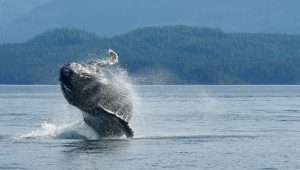
People & Culture
Kahkiihtwaam ee-pee-kiiweehtataahk: Bringing it back home again
The story of how a critically endangered Indigenous language can be saved
- 6310 words
- 26 minutes
This article is over 5 years old and may contain outdated information.
People & Culture

It began at the Pacific Ocean near the foot of the Chilkoot and White Passes, and ended at Fort Yukon, Alaska, a major Arctic resupply point for 19th century Klondike miners. In total I travelled 1,500 kilometres by canoe, historic train and hiking boots.
During almost five weeks of paddling the Yukon River mostly in flood conditions, I took roughly 133,100 paddle strokes, moved 1,663.75 tons of water (more than 10 kilograms per paddle stroke), was bitten 515 times by mosquitoes and three deer flies, got lost twice (in Yukon Flats) and suffered six callouses, three burns and two blisters. Most days it rained or threatened rain.
Sometimes I climbed exhausted into my tent only to find it already occupied by many winged, blood-thirsty inhabitants. Twice I crawled into my sleeping bag at night after having paddled 90 kilometres, too bushed to make supper. Several times I had trouble finding a campsite, and thought I’d have to sleep in my canoe under a tarpaulin all night in the pouring rain. One evening I zipped the tent door closed and prepared for bed as the sound of pattering rain started once again. But no… it wasn’t rain. Thousands of swarming insects outside were bumping up against the tent fly. Everyone one of them wanted to taste my warm blood. I felt like an item on the dinner-buffet table. It gave me the creeps.
Still, this was a fantastic adventure!
If you think you’re ready to tackle a similar life goal, consider these questions:
• Does the idea of having six mosquito bites on the back of your neck make you itch for urban luxuries?
• Does having a large, wet, cold spot at the bottom of your sleeping bag make you dream longingly of a five-star spa?
• Do you mind not taking a shower for 8-10 days at a time, even when your body is layered in sweat, sun block and insect repellent?
• Do you mind being the worst-smelling animal in the wilderness?
• Does it bother you that even bears won’t poke around your campsite because they think you’ve gone bad?
• Does it dampen your optimism if it rains for seven days in a row?
• Does finding bear claw marks (long and deep) on the tree beside your tent make you want to sleep in a high security bank vault for a week?
• Does it disgust you having dirt and mosquito body parts under your fingernails all day?
Before you set out on an adventure like this one, carefully and thoughtfully assess your skills and experience. Be completely honest. Over-confidence has killed many a wilderness guide — world experts. Perhaps that’s what Roald Amundsen (the great Norwegian explorer who first navigated the Northwest Passage and led the first successful expedition to the South Pole) meant when he said, “Adventure is just bad planning.”
“Adventure” in itself isn’t bad, in my opinion; but sloppy planning leads to unnecessary risk.
I planned and trained for seven years. But during much of my adventure I was wet, cold and sometimes lost in extreme wilderness near the Arctic Circle. It wasn’t easy. Boiling currents, floating trees, snags and log jams posed unexpected dangers. That is the nature of wilderness travel. Extensive planning is vital, but luck can run against you.
Most of us have a romantic Victorian view of nature. Bunny rabbits might appear cute, but they have twitchy noses and nervous dispositions for one reason — they’re at the very bottom of the food chain. Extreme alertness helps them survive another day.
Solo wilderness trekkers need to be on guard constantly, acutely aware of approaching dangers. In the land of grizzly bears and icy rivers, wishful thinking (or outright arrogance) can kill you. When you’re dancing without a safety net, skills are necessary, but experience is critical. Skills can be learned in a weekend; experience takes years to accumulate.
So start planning your great adventure. Build up skills and experience until you have well-founded confidence in your abilities. Then go for it. Explore your dream.
Visit The Royal Canadian Geographical Society website to read more about Allen Macartney’s expedition on the Yukon River.
Are you passionate about Canadian geography?
You can support Canadian Geographic in 3 ways:

People & Culture
The story of how a critically endangered Indigenous language can be saved

Places
In Banff National Park, Alberta, as in protected areas across the country, managers find it difficult to balance the desire of people to experience wilderness with an imperative to conserve it

Travel
Kingfisher Wilderness Adventures brings you face-to-face with the wildlife in one of North America's most biodiverse marine areas

Travel
On the coast of B.C.’s mainland awaits an immersive experience on the water’s edge, where tourism can be an act of reconciliation